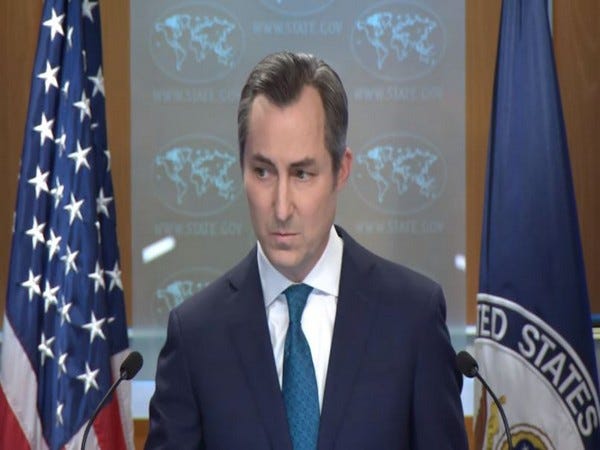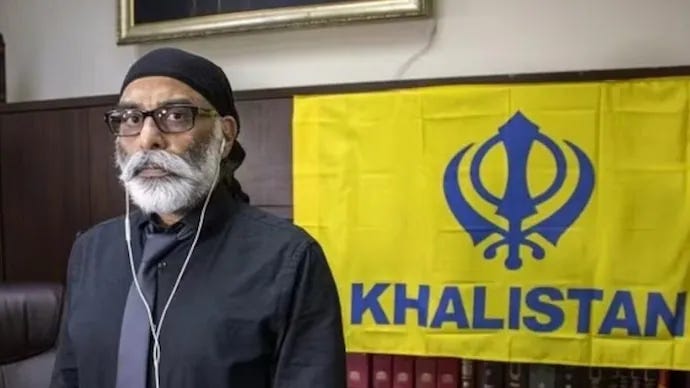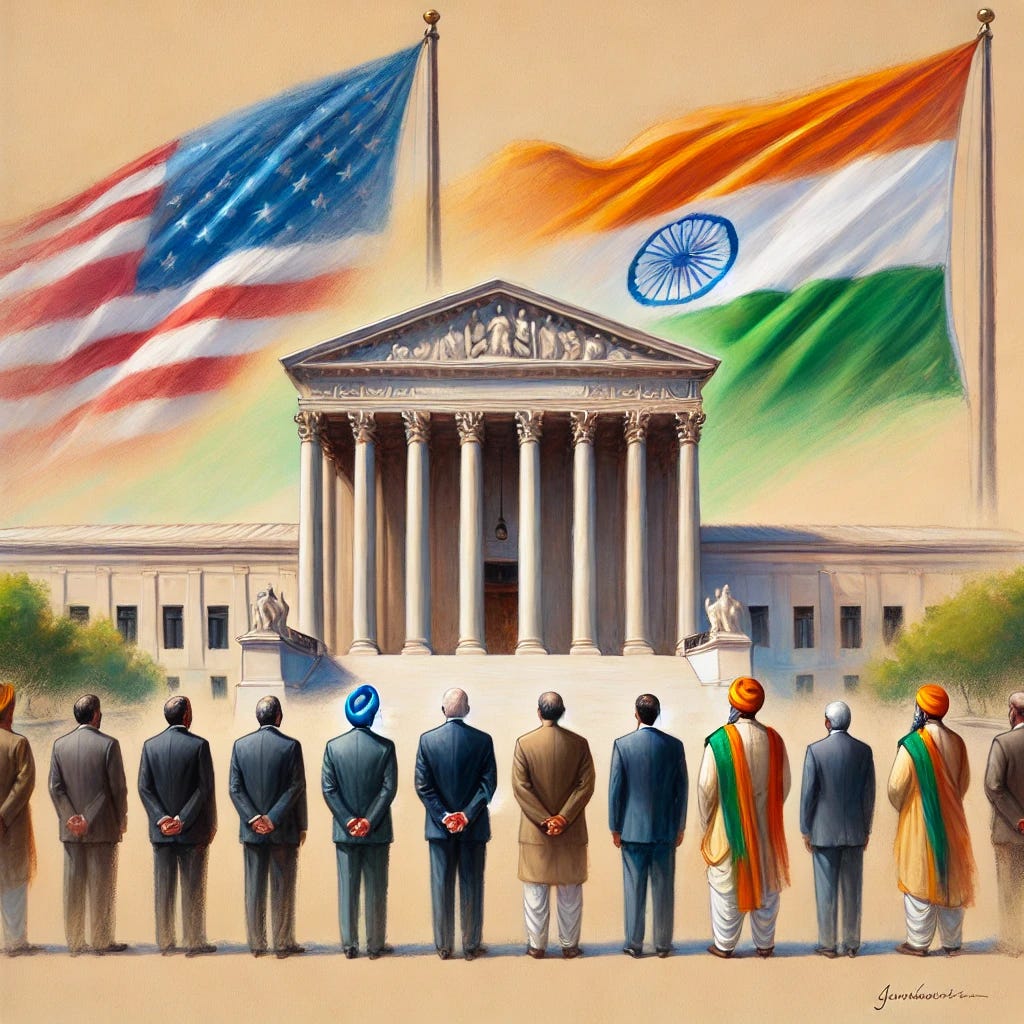US Secures RAW Officer Vikram Yadav's Removal, India Avoids His Prosecution
Gurpatwant Singh Pannun Assassination Plot: Indian Delegation in Washington, DC, US Expresses Satisfaction with Indian Cooperation. Rogue RAW "no longer an employee of the Indian Government."
India-US Negotiations Lead to Diplomatic Breakthrough in Pannun Assassination Plot Inquiry
In a significant development on Thursday, 17th October, Indian authorities assured the United States that the officer from the Research and Analysis Wing (RAW) allegedly involved in a plot to assassinate Sikh separatist leader Gurpatwant Singh Pannun— a designated terrorist under the Indian laws— is "no longer an employee of the Indian government." The officer, a former CRPF officer on deputation to RAW, was identified by The Washington Post as Vikram Yadav. In response, the US side assured that the Justice Department would not be pressing charges against Yadav. These mutual assurances came after a meeting in Washington, DC today, amid heightened scrutiny surrounding the alleged conspiracy and the role of Indian intelligence in the case.
The United States has expressed satisfaction with India's cooperation in the ongoing investigation. US State Department spokesperson Matthew Miller stated, "We are satisfied with India's cooperation in this matter. The meetings with Indian officials, including their inquiry committee, have been productive, and we believe there has been a genuine effort to engage with the process." Miller's remarks highlight the importance both nations place on resolving this sensitive issue while maintaining strong bilateral relations.
Background of the Case
Miller’s remarks come amidst a backdrop of intensified scrutiny surrounding the alleged involvement of Indian intelligence officers in the assassination plot. Despite the seriousness of the allegations, both the US and India have shown a shared interest in preserving their strong diplomatic relationship, given India’s strategic importance in the Indo-Pacific region. While the US indictment, unsealed in November, included a significant allegation that the plot was directed by an Indian official, Vikram Yadav, referred to only as “CC-1,” was not explicitly linked to the Research and Analysis Wing (RAW) in the document.
This measured approach is further reflected in the US Justice Department’s decision not to press charges against Yadav at this time, indicating a focus on maintaining cooperation and avoiding actions that might disrupt the broader partnership. The mutual decision to avoid Yadav’s prosecution can be viewed as a diplomatic success for both sides. For India, this outcome helps avoid potential legal and diplomatic complications, such as an extradition request, which could have strained relations. Additionally, any trial in the US could have exposed sensitive intelligence details, potentially causing embarrassment or diplomatic tension.
By opting for a path of negotiation and cooperation, both countries have demonstrated their commitment to resolving the issue without compromising the broader bilateral relationship, a reflection of the complex and nuanced nature of international diplomacy.
Indian Government's Response
Although the Indian government spokesperson has not publicly addressed the detailed allegations presented in media reports, it has taken several steps to demonstrate its commitment to transparency and accountability. A high-level inquiry committee has been set up to investigate the claims surrounding the plot, particularly the involvement of Vikram Yadav, a former officer in India’s external intelligence agency, RAW.
A senior official involved in the inquiry was quoted saying, "We are taking this matter seriously and conducting a thorough internal investigation to understand the full scope of the allegations. We have maintained clear lines of communication with our US counterparts and will continue to do so." This statement highlights India's willingness to address the concerns of the United States, especially when they involve sensitive intelligence operations on the US soil.
Furthermore, India has officially and categorically denied any institutional involvement in the plot, distancing itself from the alleged actions of rogue elements. By clarifying that the individual implicated as 'CC1' in the US Department of Justice’s indictment is no longer affiliated with the Indian government, India has sought to mitigate potential damage to its reputation and diplomatic ties with the United States. This move ultimately resulted in a significant concession, with the US Department of Justice opting not to press charges against 'CC1,' now widely believed to be Vikram Yadav. This decision represents a key diplomatic achievement for India, allowing it to avoid further strain on bilateral relations while protecting its intelligence apparatus from further exposure.
Identification of 'CC1' and RAW’s Alleged Involvement
The controversy deepened and diplomatic tensions escalated following a Washington Post report on 29th April, 2024, which identified Vikram Yadav, an officer from the Research and Analysis Wing (RAW), as the individual referred to as ‘CC1’ in the US Department of Justice indictment. Yadav, originally deputed from the Central Reserve Police Force (CRPF) to RAW, is alleged to have played a pivotal role in orchestrating a plot to assassinate Gurpatwant Singh Pannun, a prominent pro-Khalistan separatist leader and US citizen residing in the United States. This revelation significantly intensified scrutiny of India's intelligence operations and further strained bilateral relations with the US.
The indictment, unsealed in a US court in June this year, alleges that Yadav (referred to as CC1) instructed a hired hit team to assassinate Gurpatwant Singh Pannun, even providing them with details such as Pannun’s New York address. According to sources cited by The Washington Post, the operation was reportedly sanctioned by the then RAW chief based in New Delhi. This revelation of high-level approval has further complicated the situation, raising serious concerns about the involvement of senior Indian intelligence officials in actions beyond the bounds of international law. Additionally, it has cast a shadow over the otherwise thriving India-US relations, introducing an element of tension into their strategic partnership.
Alleged Approval from Top RAW Leadership
One of the most damning aspects of The Washington Post report was the claim that the operation had tacit approval from the Research and Analysis Wing (RAW) leadership at the time. US intelligence agencies, based on their assessments, suggested that the assassination plot targeting Pannun was cleared by Samant Goel, the RAW chief during that period, whose name was mentioned as many as 16 times in the newspaper’s report on 29th April. Even without fully verifying this explosive claim, it positioned the case within a broader narrative of potential misuse of state intelligence capabilities, raising serious concerns about the involvement of senior officials in such extrajudicial activities.
The implications of this development were significant, potentially straining India’s diplomatic standing not only with the US but also with other Western allies who have increasingly expressed concerns about extrajudicial operations. "We are assessing the full scope of what this means for our intelligence-sharing arrangements," a US official familiar with the situation was quoted as saying, reflecting growing unease about RAW’s role in such incidents.
Details of the Alleged Plot
The intricate details of the plot— as outlined in both the indictment and The Washington Post report— are quite alarming. Vikram Yadav allegedly orchestrated the operation from abroad, providing specific instructions to eliminate Pannun. According to the indictment, Yadav maintained encrypted communications with Nikhil Gupta, an Indian national arrested in Prague, which became a key piece of evidence in the US Department of Justice’s case. The texts between Yadav and Gupta revealed extensive discussions about the logistics of the assassination, including gathering information on Pannun’s whereabouts and determining the best time to carry out the hit.
The US Justice Department has now chosen to pursue charges solely against Gupta, while opting not to charge Yadav at this time. This strategic decision is likely the result of bilateral negotiations between the two nations and influenced by the broader geopolitical landscape. US officials have indicated that while Yadav remains a key figure in the investigation, directly implicating an Indian intelligence officer at this stage could disrupt the expanding Indo-US security cooperation, particularly in counterterrorism efforts.
Broader Implications for RAW
The controversy surrounding this plot has brought renewed attention to the global activities of the Research and Analysis Wing (RAW). The Washington Post report also referenced other incidents in which RAW officers or operatives have faced legal actions or diplomatic challenges in countries such as Australia, Germany, and the United Kingdom. While these instances have raised questions about RAW’s operations abroad, it is important to note that intelligence agencies worldwide often face complex legal and diplomatic environments.
"Indian intelligence agencies, particularly RAW, have been expanding their footprint globally," remarked a Western intelligence analyst, acknowledging RAW’s evolving role on the international stage. While such cases may pose challenges, they also highlight the difficult balancing act that intelligence agencies must navigate in their operations. The ongoing case could prompt a review of how RAW’s activities are perceived by other international intelligence agencies, but cooperation in key areas such as counterterrorism and security is likely to remain a priority for both India and its global partners.
US Justice Department’s Approach
The US Justice Department has so far indicted only Nikhil Gupta, but it has indefinitely postponed any action against Vikram Yadav, opting not to pursue further charges or escalate diplomatic tensions. Officials familiar with the case suggest that the US government’s decision to defer—effectively amounting to dropping the charges—stems from a desire to preserve strategic ties with India. As a key player in the US's Indo-Pacific strategy, India’s cooperation is crucial, and any serious diplomatic fallout could complicate ongoing counterterrorism efforts and intelligence-sharing initiatives in the region.
While the US Justice Department had initially kept its options open, the matter seems to have been finalised following high-level talks between the two nations’ delegations in Washington, DC. However, the indictment against Nikhil Gupta remains active, though legal experts suggest that without Vikram Yadav's testimony or his arraignment as a co-accused, the case against Gupta could be significantly weakened. The absence of Yadav’s involvement in the trial may complicate efforts to secure a conviction, potentially limiting the prosecution's ability to present a complete narrative.
Impact of US Decision on Pannun’s Civil Lawsuit
Though Gurpatwant Singh Pannun's civil lawsuit is not directly tied to the indictment of Nikhil Gupta, who has been arraigned as the prime accused in the alleged assassination plot, the US Justice Department's decision not to press charges against Vikram Yadav may weaken Pannun's case further. Pannun, an India-born US-Canadian citizen and leader of the pro-Khalistan group Sikhs for Justice, filed a civil lawsuit in the US District Court for the Southern District of New York, alleging that Indian intelligence officials, including NSA Ajit Doval and former RAW chief Samant Goel, orchestrated a plot to assassinate him on US soil. While the merits of the lawsuit remain nebulous, the absence of charges against Yadav, who was named in both the lawsuit and the indictment, reduces the strength of Pannun's legal claims. Summons were issued to high-ranking Indian officials, including Doval, Goel, and Yadav, asking them to respond within 21 days, but the diplomatic implications and legal immunity may also complicate Pannun's pursuit of the case.
Pannun, of course, is leaving no stone unturned to keep the issue alive, as evidenced by his recent outrageous interview with Bloomberg.
Diplomatic Breakthrough in Washington, DC
US Secures Yadav's Dismissal, India Avoids Prosecution
In summary, today’s diplomatic development, following the meeting between Indian and US delegations in Washington, DC, marked a significant breakthrough. The US successfully achieved its objective of securing the removal of the controversial RAW officer, Vikram Yadav, from active government service, while India scored a diplomatic victory by avoiding his prosecution and a potential extradition request from the US.
Contrast with India-Canada Relations
This diplomatic success stands in stark contrast to India’s worsening relations with Canada. The assassination of Hardeep Singh Nijjar in Vancouver in June last year—allegedly involving the same RAW officer, Yadav—has strained ties between the two nations, highlighting the different diplomatic dynamics in play. While a Canadian national was killed on Canadian soil, the case involving Pannun, a US citizen, involved only a thwarted conspiracy with no active assassination attempt.
The Complexities of International Diplomacy
These contrasting outcomes underscore the complexities of international diplomacy, where decisions are often influenced by a balance of multiple considerations rather than clear moral judgments. The US-India case highlights the varied dimensions of global relations, where influence, strategic partnerships, and geopolitical interests all play a role in shaping outcomes.
India’s Diplomatic Acumen with the US
India’s diplomatic efforts with the US have been exemplary, with the Indian delegation managing to deftly navigate a sensitive issue without straining bilateral ties. However, the path forward with Canada is more challenging. Restoring relations will require patient diplomacy and careful effort, and it may take considerable time before the situation returns to a state of normalcy.
Disclaimer:
This article is primarily based on two published reports from The Washington Post and other credible internet news sources cited below, for whose accuracy we cannot independently verify. We do not have any personal knowledge or information regarding the events discussed.







……Yadav ji is saved….but Bad days of Nikhil Gupta are still to end…..